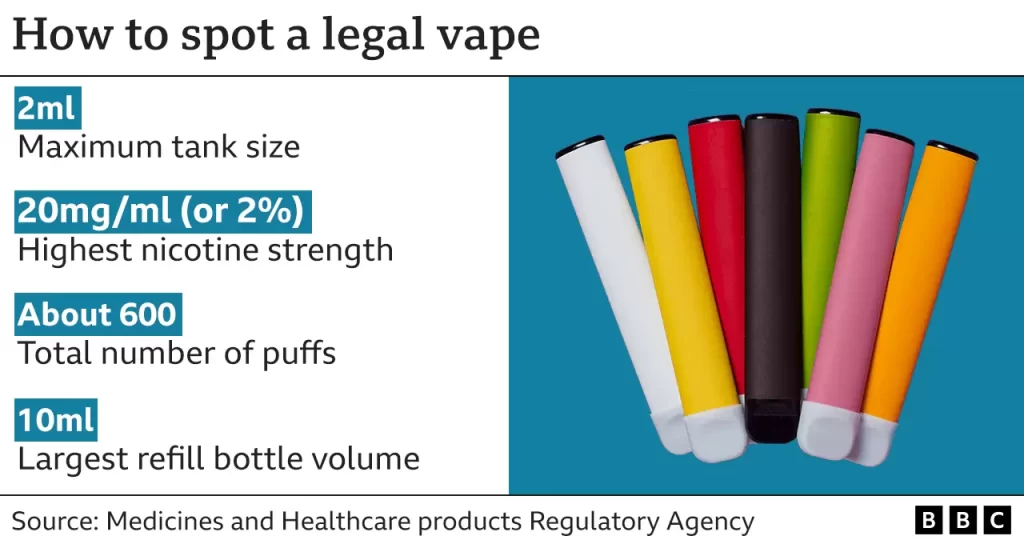Doctors specializing in children’s health are advocating for a complete prohibition on disposable vapes due to concerns about their detrimental impact on young lungs and the environment. However, an anti-smoking campaign group argues that a ban would hinder some adults in their efforts to quit smoking and potentially increase the illicit trade of vaping products. UK governments are in the process of implementing measures to reduce vaping among individuals under the age of 18, which may involve stricter regulations on the marketing and promotion of vaping products.
Although selling vapes or e-cigarettes to minors is illegal, an increasing number of 11 to 17-year-olds are experimenting with vaping, according to a YouGov survey conducted for Action on Smoking and Health (Ash). The survey reveals a rise from 7.7% in 2022 to 11.6% in 2023. Approximately 15% of 16 to 17-year-olds and 18% of 18-year-olds currently vape. Among teenagers, disposable vapes in various flavors and vibrant colors are the most popular, typically obtained from local shops for around £5 each.
Prime Minister Rishi Sunak recently criticized the design and promotion of vapes targeting children, emphasizing that they should primarily be aimed at adult smokers attempting to quit. A BBC investigation discovered unsafe levels of lead, nickel, and chromium in confiscated vapes from a secondary school, posing inhalation risks for children. Scientists examining these vapes described them as the most concerning lab test results of their kind.

The Royal College of Paediatrics and Child Health (RCPCH) now firmly advocates for a ban on disposable e-cigarettes. Dr. Mike McKean, a pediatric respiratory consultant and RCPCH vice-president, warns of an epidemic of youth vaping and urges immediate action to prevent a crisis. Health experts emphasize that smoking traditional cigarettes, containing tobacco, remains the leading cause of preventable illnesses and diseases in the UK.
Despite acknowledging the usefulness of vaping products in aiding smoking cessation, the RCPCH highlights that they are not without risks, particularly for young people whose long-term lung, heart, and brain impacts remain uncertain. Prime Minister Sunak recently announced plans to close a loophole allowing vaping companies to distribute free samples to children in England and explore increased fines for shops selling vapes illegally. Scotland is also considering a ban on disposable vapes.
- Council Approves Solar Energy Project at Merthyr Elementary School
- Security Personnel Warns of Forceful Restraint During Altercation with Individual
- Merthyr Tydfil Greenlights New Home for Children in Need of Residential Care
- Former Merthyr Quarry to be Transformed into New Residential Development Following Approval Holdup
- Law enforcement oversight: Failure to apprehend armed criminal results in tragic loss of civilian life
While some argue against a ban on disposable vapes, claiming it would drive the illegal market and hinder recycling efforts, the charity and campaign group Ash insists that disposable vapes are essential for adult smokers, particularly older individuals and those with learning disabilities, who aim to quit tobacco. Ash proposes a tax of £5 on disposable vapes to align their cost with rechargeable and reusable vaping products, making them more similar in price to a pack of cigarettes.
Additionally, Ash calls for stricter regulations on the promotion of vapes in shops to reduce their appeal to children. Green Alliance, an independent think tank, highlights the wastefulness of disposable vapes, which consume resources like lithium necessary for electric car batteries, and incur significant recycling costs. The organization criticizes current government proposals as inadequate and recommends more substantial restrictions on marketing and an end to free giveaways for children.
A spokesperson for the Department for Health and Social Care in England states that they are taking decisive action to combat youth vaping through the £3 million illicit vapes enforcement squad, targeting underage sales to children.